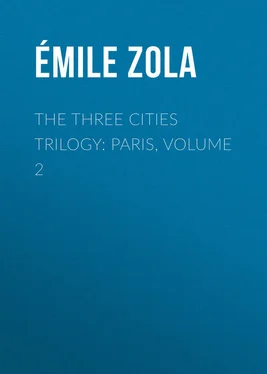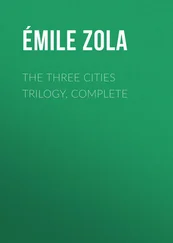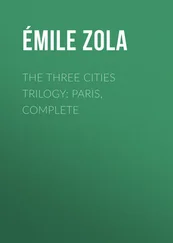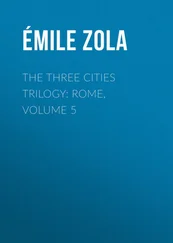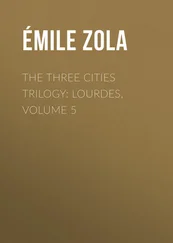Émile Zola - The Three Cities Trilogy - Paris, Volume 2
Здесь есть возможность читать онлайн «Émile Zola - The Three Cities Trilogy - Paris, Volume 2» — ознакомительный отрывок электронной книги совершенно бесплатно, а после прочтения отрывка купить полную версию. В некоторых случаях можно слушать аудио, скачать через торрент в формате fb2 и присутствует краткое содержание. Жанр: literature_19, foreign_antique, foreign_prose, на английском языке. Описание произведения, (предисловие) а так же отзывы посетителей доступны на портале библиотеки ЛибКат.
- Название:The Three Cities Trilogy: Paris, Volume 2
- Автор:
- Жанр:
- Год:неизвестен
- ISBN:нет данных
- Рейтинг книги:4 / 5. Голосов: 1
-
Избранное:Добавить в избранное
- Отзывы:
-
Ваша оценка:
- 80
- 1
- 2
- 3
- 4
- 5
The Three Cities Trilogy: Paris, Volume 2: краткое содержание, описание и аннотация
Предлагаем к чтению аннотацию, описание, краткое содержание или предисловие (зависит от того, что написал сам автор книги «The Three Cities Trilogy: Paris, Volume 2»). Если вы не нашли необходимую информацию о книге — напишите в комментариях, мы постараемся отыскать её.
The Three Cities Trilogy: Paris, Volume 2 — читать онлайн ознакомительный отрывок
Ниже представлен текст книги, разбитый по страницам. Система сохранения места последней прочитанной страницы, позволяет с удобством читать онлайн бесплатно книгу «The Three Cities Trilogy: Paris, Volume 2», без необходимости каждый раз заново искать на чём Вы остановились. Поставьте закладку, и сможете в любой момент перейти на страницу, на которой закончили чтение.
Интервал:
Закладка:
Guillaume, with his desire for tidings, was obliged to confide in his two visitors, tell them of the explosion and Salvat's flight, and how he himself had been wounded while seeking to extinguish the match. Janzen, with curly beard and hair, and a thin, fair face such as painters often attribute to the Christ, listened coldly, as was his wont, and at last said slowly in a gentle voice: "Ah! so it was Salvat! I thought it might be little Mathis – I'm surprised that it should be Salvat – for he hadn't made up his mind." Then, as Guillaume anxiously inquired if he thought that Salvat would speak out, he began to protest: "Oh! no; oh! no."
However, he corrected himself with a gleam of disdain in his clear, harsh eyes: "After all, there's no telling. Salvat is a man of sentiment."
Then Bache, who was quite upset by the news of the explosion, tried to think how his friend Guillaume, to whom he was much attached, might be extricated from any charge of complicity should he be denounced. And Guillaume, at sight of Janzen's contemptuous coldness, must have suffered keenly, for the other evidently believed him to be trembling, tortured by the one desire to save his own skin. But what could he say, how could he reveal the deep concern which rendered him so feverish without betraying the secret which he had hidden even from his brother?
However, at this moment Sophie came to tell her master that M. Theophile Morin had called with another gentleman. Much astonished by this visit at so late an hour, Pierre hastened into the next room to receive the new comers. He had become acquainted with Morin since his return from Rome, and had helped him to introduce a translation of an excellent scientific manual, prepared according to the official programmes, into the Italian schools. 2 2 See M. Zola's "Rome," Chapters IV. and XVI.
A Franc-Comtois by birth, a compatriot of Proudhon, with whose poor family he had been intimate at Besancon, Morin, himself the son of a journeyman clockmaker, had grown up with Proudhonian ideas, full of affection for the poor and an instinctive hatred of property and wealth. Later on, having come to Paris as a school teacher, impassioned by study, he had given his whole mind to Auguste Comte. Beneath the fervent Positivist, however, one might yet find the old Proudhonian, the pauper who rebelled and detested want. Moreover, it was scientific Positivism that he clung to; in his hatred of all mysticism he would have naught to do with the fantastic religious leanings of Comte in his last years. And in Morin's brave, consistent, somewhat mournful life, there had been but one page of romance: the sudden feverish impulse which had carried him off to fight in Sicily by Garibaldi's side. Afterwards he had again become a petty professor in Paris, obscurely earning a dismal livelihood.
When Pierre returned to the bedroom he said to his brother in a tone of emotion: "Morin has brought me Barthes, who fancies himself in danger and asks my hospitality."
At this Guillaume forgot himself and became excited: "Nicholas Barthes, a hero with a soul worthy of antiquity. Oh! I know him; I admire and love him. You must set your door open wide for him."
Bache and Janzen, however, had glanced at one another smiling. And the latter, with his cold ironical air, slowly remarked: "Why does Monsieur Barthes hide himself? A great many people think he is dead; he is simply a ghost who no longer frightens anybody."
Four and seventy years of age as he now was, Barthes had spent nearly half a century in prison. He was the eternal prisoner, the hero of liberty whom each successive Government had carried from citadel to fortress. Since his youth he had been marching on amidst his dream of fraternity, fighting for an ideal Republic based on truth and justice, and each and every endeavour had led him to a dungeon; he had invariably finished his humanitarian reverie under bolts and bars. Carbonaro, Republican, evangelical sectarian, he had conspired at all times and in all places, incessantly struggling against the Power of the day, whatever it might be. And when the Republic at last had come, that Republic which had cost him so many years of gaol, it had, in its own turn, imprisoned him, adding fresh years of gloom to those which already had lacked sunlight. And thus he remained the martyr of freedom: freedom which he still desired in spite of everything; freedom, which, strive as he might, never came, never existed.
"But you are mistaken," replied Guillaume, wounded by Janzen's raillery. "There is again a thought of getting rid of Barthes, whose uncompromising rectitude disturbs our politicians; and he does well to take his precautions!"
Nicholas Barthes came in, a tall, slim, withered old man, with a nose like an eagle's beak, and eyes that still burned in their deep sockets, under white and bushy brows. His mouth, toothless but still refined, was lost to sight between his moustaches and snowy beard; and his hair, crowning him whitely like an aureola, fell in curls over his shoulders. Behind him with all modesty came Theophile Morin, with grey whiskers, grey, brush-like hair, spectacles, and yellow, weary mien – that of an old professor exhausted by years of teaching. Neither of them seemed astonished or awaited an explanation on finding that man in bed with an injured wrist. And there were no introductions: those who were acquainted merely smiled at one another.
Barthes, for his part, stooped and kissed Guillaume on both cheeks. "Ah!" said the latter, almost gaily, "it gives me courage to see you."
However, the new comers had brought a little information. The boulevards were in an agitated state, the news of the crime had spread from cafe to cafe, and everybody was anxious to see the late edition which one paper had published giving a very incorrect account of the affair, full of the most extraordinary details. Briefly, nothing positive was as yet known.
On seeing Guillaume turn pale Pierre compelled him to lie down again, and even talked of taking the visitors into the next room. But the injured man gently replied: "No, no, I promise you that I won't stir again, that I won't open my mouth. But stay there and chat together. I assure you that it will do me good to have you near me and hear you."
Then, under the sleepy gleams of the lamp, the others began to talk in undertones. Old Barthes, who considered that bomb to be both idiotic and abominable, spoke of it with the stupefaction of one who, after fighting like a hero through all the legendary struggles for liberty, found himself belated, out of his element, in a new era, which he could not understand. Did not the conquest of freedom suffice for everything? he added. Was there any other problem beyond that of founding the real Republic? Then, referring to Mege and his speech in the Chamber that afternoon, he bitterly arraigned Collectivism, which he declared to be one of the democratic forms of tyranny. Theophile Morin, for his part, also spoke against the Collectivist enrolling of the social forces, but he professed yet greater hatred of the odious violence of the Anarchists; for it was only by evolution that he expected progress, and he felt somewhat indifferent as to what political means might bring about the scientific society of to-morrow. And in like way Bache did not seem particularly fond of the Anarchists, though he was touched by the idyllic dream, the humanitarian hope, whose germs lay beneath their passion for destruction. And, like Barthes, he also flew into a passion with Mege, who since entering the Chamber had become, said he, a mere rhetorician and theorist, dreaming of dictatorship. Meantime Janzen, still erect, his face frigid and his lips curling ironically, listened to all three of them, and vented a few trenchant words to express his own Anarchist faith; the uselessness of drawing distinctions, and the necessity of destroying everything in order that everything might be rebuilt on fresh lines.
Читать дальшеИнтервал:
Закладка:
Похожие книги на «The Three Cities Trilogy: Paris, Volume 2»
Представляем Вашему вниманию похожие книги на «The Three Cities Trilogy: Paris, Volume 2» списком для выбора. Мы отобрали схожую по названию и смыслу литературу в надежде предоставить читателям больше вариантов отыскать новые, интересные, ещё непрочитанные произведения.
Обсуждение, отзывы о книге «The Three Cities Trilogy: Paris, Volume 2» и просто собственные мнения читателей. Оставьте ваши комментарии, напишите, что Вы думаете о произведении, его смысле или главных героях. Укажите что конкретно понравилось, а что нет, и почему Вы так считаете.
